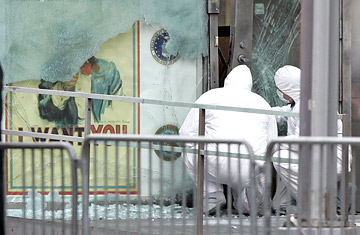
New York City police officers with the bomb squad unit inspect the damage done by an explosive device to the military recruitment center March 6, 2008 in New York's Times Square.
New York City's Times Square — the pulsating heart of this teeming metropolis — was its usual, frenetic self Thursday morning, its scores of corporate billboards and animated displays shimmering brightly above the crush of people bustling to work. But something was amiss. Sections of the district were cordoned off with barricades and yellow tape; traffic was snarled, and police swarmed the area. For those unaware of what transpired here overnight, news crawls bellowed the troubling headlines: "TIMES SQUARE BOMBED." Authorities are investigating whether the attack is linked to two previous bombings that bore eerie similarities.
At approximately 3:45 a.m. Thursday, a "low-order" explosive device was detonated on the Times Square traffic island bounded by 43rd and 44th Streets, Broadway and Seventh Avenue. No one was injured and no suspects have been apprehended. "This was not a particularly sophisticated device," said New York Police Commissioner Ray Kelly, who cautioned the explosive was nonetheless "capable of causing injury or death." At a news conference, Kelly brandished an unassuming green ammunition container — readily available, he said, in military supply stores — similar to that which held the crudely fashioned bomb. He said witnesses placed a hooded man with a backpack riding a bicycle on the island before the blast. Police released a grainy surveillance video Thursday afternoon of the attack showing a bicyclist on the island immediately before the loud blast, which sent white smoke billowing through the empty intersection.
The explosion was apparently "deliberately directed" at a U.S. military recruiting station, the Armed Forces Career Center, situated on the triangular space dubbed "Military Island". No one was inside the steel and glass-paneled facility at the time of the blast, which cracked the front door and shattered a window. The building, which is positioned across the street from a police station and jointly houses Army, Navy, Air Force and Marine recruiters, has been the site of anti-war demonstrations. Late Thursday, Politico.com, citing congressional insiders, said that eight House Democrats were mailed a letter and photo of the Times Square recruiting station in Manhattan before it was bombed.
Though the attack resulted in no injuries and minimal damage, it raised unsettling concerns: chiefly, that it could be connected to two prior bombings with similar hallmarks. Last October, a device containing explosive powder was lobbed over the fence at the Mexican consulate, located just a few blocks southeast. The British consulate, also in Midtown, was the target of a similar bombing in 2005. Both of those attacks blew out windows. Those attacks also reportedly took place between 3:30 and 4:00 a.m. and were perpetrated by a person riding a bicycle. Forensic evidence is being sent to FBI headquarters in Quantico, Va., to examine possible links between the incidents.
Officials denounced Thursday's attack with strong language. "Whoever the coward was that committed this disgraceful act on our city will be found and prosecuted to the full extent of the law," New York City Mayor Michael Bloomberg told reporters at a press conference Thursday morning. "We will not tolerate such attacks." Army Captain Charles Jaquillard, commander of recruiting in Manhattan, told the Associated Press, "If it is something that's directed toward American troops, then it's something that's taken very seriously."
The city quickly regained its equilibrium. Streets reopened and subway service was restored. "New York City is back and open for business," Bloomberg said. Even tourists at the scene — holding cameras aloft and chattering on cell phones — seemed largely unruffled by the incident. "I do feel quite safe still," says Sandra Bell, a tourist on vacation from Glasgow, Scotland. Still, she says, standing just yards from the spot where she's often watched the iconic ball descend to herald each New Year, "it's amazing to think something would happen here." As uniformed military personnel ducked in and out of the recruiting office, the poster of Uncle Sam maintained his familiar pose — eyes fixed on prospective recruits, index finger outstretched, issuing his trademark beckoning call: "I Want You." But to Damian Brown, 31, peering at the scene from across the street, the blast conveyed the opposite message. "Time to bring those boys home," he says quietly.
